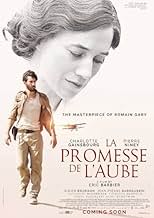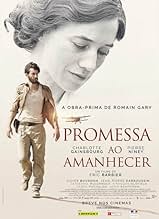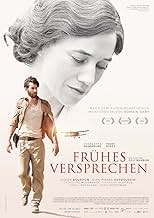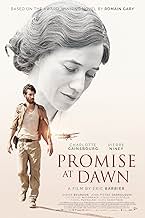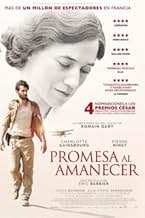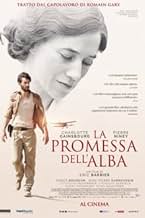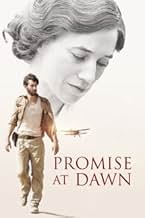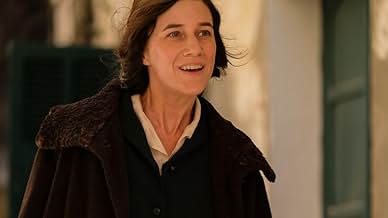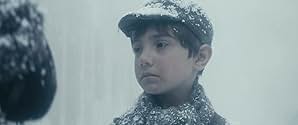La promesse de l'aube
- 2017
- Tous publics
- 2h 11min
NOTE IMDb
7,1/10
4,1 k
MA NOTE
Romain Gary a vécu une vie extraordinaire. Mais cet acharnement à vivre mille vies, à devenir un grand homme et un écrivain célèbre, c'est à Nina, sa mère, qu'il le doit.Romain Gary a vécu une vie extraordinaire. Mais cet acharnement à vivre mille vies, à devenir un grand homme et un écrivain célèbre, c'est à Nina, sa mère, qu'il le doit.Romain Gary a vécu une vie extraordinaire. Mais cet acharnement à vivre mille vies, à devenir un grand homme et un écrivain célèbre, c'est à Nina, sa mère, qu'il le doit.
- Réalisation
- Scénario
- Casting principal
- Récompenses
- 1 victoire et 7 nominations au total
Avis à la une
I confess that I had great expectations and some emotions before seeing 'La promesse de l'aube'. Romain Gary was together with Boris Vian, the favorite French writer of my adolescence, and 'La promesse de l'aube' was one of my beloved books paired with Vian's 'L'ecume des jours'. The new version of the film (its second adaptation to screen) directed by Eric Barbier fully met my expectations.
The book and the film tell about two love stories. The first of these is the love of a mother for her son, an unlimited love, a love that is remembered by the writer over the years, a love that determined the course of his life. In most of the world's literature and languages for such a mother the common expression is 'Jewish mother', only in Hebrew such a mother is called a 'Polish mother'! Both fit here. The son's answer is, of course, the book that Romain Gary wrote decades later, the book that inspired the film. I can say without hesitation that this book is unique in the literature in its description of the relationship between a mother and her son. The second love story is for France. The book's heroine passionately loves her country of adoption, the country that saved her life, sheltered her, gave her the dignity. Nina Kacew educates her son to love France, returning the love that seems to have been offered to them unconditionally. However, none of the two love stories are happy to the end. Romain Gary's life will be cut short by suicide, and it is impossible to establish which were the sources of despair and disappointment that led to this, but it can not be ruled out that the partial failure of the life plan predestined by his mother had a role. The love of the Jews sheltered by France for their country and their readiness to return their gratitude with all sacrifices, including life, was hardly put to the test of history, from the Dreyfuss case to the racial persecutions and deportations during the Second World War. The book and the film end up in an optimistic note, but readers and viewers know this is not the whole story.
'La promesse de l'aube' is a captivating and exciting movie. Many viewers, probably, like me, know the intrigue and the characters, yet the precision of the details, together with the sensitivity and the passion of the actors, create a moving story that cannot leave the spectators indifferent. Charlotte Gainsbourg is fascinating as a woman living through several ages, struggling to survive and succeed, radiating the fierce love for her son, conveying her passion for life and her love for the adoptive country. All the three actors who represent the writer at different ages are excellently chosen and play very well, with a special mention for Pierre Niney who creates again a superb role and consolidates in my eyes his position as one of the best French actors of the moment. Watching the film not only did not disappoint me at any point in comparison with the emotions related to reading 'La promesse de l'aube' many decades ago, but added new dimensions to the intellectual experience around this exceptional book.
The book and the film tell about two love stories. The first of these is the love of a mother for her son, an unlimited love, a love that is remembered by the writer over the years, a love that determined the course of his life. In most of the world's literature and languages for such a mother the common expression is 'Jewish mother', only in Hebrew such a mother is called a 'Polish mother'! Both fit here. The son's answer is, of course, the book that Romain Gary wrote decades later, the book that inspired the film. I can say without hesitation that this book is unique in the literature in its description of the relationship between a mother and her son. The second love story is for France. The book's heroine passionately loves her country of adoption, the country that saved her life, sheltered her, gave her the dignity. Nina Kacew educates her son to love France, returning the love that seems to have been offered to them unconditionally. However, none of the two love stories are happy to the end. Romain Gary's life will be cut short by suicide, and it is impossible to establish which were the sources of despair and disappointment that led to this, but it can not be ruled out that the partial failure of the life plan predestined by his mother had a role. The love of the Jews sheltered by France for their country and their readiness to return their gratitude with all sacrifices, including life, was hardly put to the test of history, from the Dreyfuss case to the racial persecutions and deportations during the Second World War. The book and the film end up in an optimistic note, but readers and viewers know this is not the whole story.
'La promesse de l'aube' is a captivating and exciting movie. Many viewers, probably, like me, know the intrigue and the characters, yet the precision of the details, together with the sensitivity and the passion of the actors, create a moving story that cannot leave the spectators indifferent. Charlotte Gainsbourg is fascinating as a woman living through several ages, struggling to survive and succeed, radiating the fierce love for her son, conveying her passion for life and her love for the adoptive country. All the three actors who represent the writer at different ages are excellently chosen and play very well, with a special mention for Pierre Niney who creates again a superb role and consolidates in my eyes his position as one of the best French actors of the moment. Watching the film not only did not disappoint me at any point in comparison with the emotions related to reading 'La promesse de l'aube' many decades ago, but added new dimensions to the intellectual experience around this exceptional book.
I enjoyed very much this film based on the novel "La Promesse de l'Aube " of Romain Gary. A beautiful story about the complicated and touching relationship of Romain and his mother Nina who wants that her son becomes the ambassador of France and a great writer.
So we follow Romain and Nina in Vilnius and later Varsaw, the childhood of Romain-the first love with Valentina-, the business of his mother and the antisemitism. The travel to Nice, the beginning of the writing,and then the Second World Wae- the troubles of Romain because of his Jew origin., Romain joining the French Liberation army, the stay in Africa and later his engagement in the French Liberation army.
I enjoyed very much the perfomances of Pierre Niney,Charlotte Gaisbourg, Didier Bourdon, Jean-Pierre Droussin and Catherine Mc Cormack.
So we follow Romain and Nina in Vilnius and later Varsaw, the childhood of Romain-the first love with Valentina-, the business of his mother and the antisemitism. The travel to Nice, the beginning of the writing,and then the Second World Wae- the troubles of Romain because of his Jew origin., Romain joining the French Liberation army, the stay in Africa and later his engagement in the French Liberation army.
I enjoyed very much the perfomances of Pierre Niney,Charlotte Gaisbourg, Didier Bourdon, Jean-Pierre Droussin and Catherine Mc Cormack.
A great story, well told and represented. A good movie starts in a great script. French cinema continues to bring us the finest art.
The demands in the name of love seem too harsh, even absurd. Maternal love is great, and so it is. But I don't think the maternal love in this film deserves to be publicized. The greatness here is entirely due to Roman's success. If Roman did not succeed, is there a circle in his maternal love. Roman's success depends on faith and luck. Mother's love is great, and it's hard to have a second Roman.
Very good dramatic comedy about the impressive life of Jewish writer and military pilot Romain Gary (Kacew), his relashionship with his crazy, controlling and abusive mother (he loved her, but I did not see a so bad mother since Brian de Palma's "Carrie") and anti-Semitism during and before World War II. Quite dark humor for narrating a glorious but tragic life.
Le saviez-vous
- AnecdotesTo prepare the character of Nina, actress Charlotte Gainsbourg admits to have been inspired by her paternal grandmother, also of Russian origin.
- Citations
Roman Kacew, dit Romain Gary: I made the promise to straighten the world and lay it at his feet
- ConnexionsFeatured in ACS France (2018)
- Bandes originalesThe Twins
Composed by Max Richter
Meilleurs choix
Connectez-vous pour évaluer et suivre la liste de favoris afin de recevoir des recommandations personnalisées
- How long is Promise at Dawn?Alimenté par Alexa
Détails
- Date de sortie
- Pays d’origine
- Sites officiels
- Langues
- Aussi connu sous le nom de
- Promise at Dawn
- Lieux de tournage
- Bordighera, Imperia, Liguria, Italie(Interior and exterior scenes)
- Sociétés de production
- Voir plus de crédits d'entreprise sur IMDbPro
Box-office
- Montant brut mondial
- 9 242 157 $US
- Durée
- 2h 11min(131 min)
- Couleur
- Rapport de forme
- 2.39 : 1
Contribuer à cette page
Suggérer une modification ou ajouter du contenu manquant


